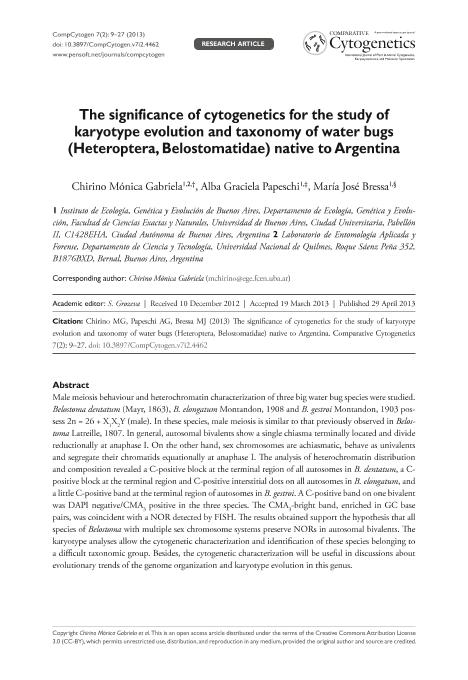Artículo
The significance of cytogenetics for the study of karyotype evolution and taxonomy of water bugs (Heteroptera, Belostomatidae) native to Argentina
Fecha de publicación:
04/2013
Editorial:
Zoological Institute
Revista:
Comparative Cytogenetics
ISSN:
1993-078X
Idioma:
Inglés
Tipo de recurso:
Artículo publicado
Clasificación temática:
Resumen
Male meiosis behaviour and heterochromatin characterization of three big water bug species were studied. Belostoma dentatum (Mayr, 1863), B. elongatum Montandon, 1908 and B. gestroi Montandon, 1903 possess 2n = 26 + X1X2Y (male). In these species, male meiosis is similar to that previously observed in Belostoma Latreille, 1807. In general, autosomal bivalents show a single chiasma terminally located and divide reductionally at anaphase I. On the other hand, sex chromosomes are achiasmatic, behave as univalents and segregate their chromatids equationally at anaphase I. The analysis of heterochromatin distribution and composition revealed a C-positive block at the terminal region of all autosomes in B. dentatum, a Cpositive block at the terminal region and C-positive interstitial dots on all autosomes in B. elongatum, and a little C-positive band at the terminal region of autosomes in B. gestroi. A C-positive band on one bivalent was DAPI negative/CMA3 positive in the three species. The CMA3-bright band, enriched in GC base pairs, was coincident with a NOR detected by FISH. The results obtained support the hypothesis that all species of Belostoma with multiple sex chromosome systems preserve NORs in autosomal bivalents. The karyotype analyses allow the cytogenetic characterization and identification of these species belonging to a difficult taxonomic group. Besides, the cytogenetic characterization will be useful in discussions about evolutionary trends of the genome organization and karyotype evolution in this genus.
Archivos asociados
Licencia
Identificadores
Colecciones
Articulos(IEGEBA)
Articulos de INSTITUTO DE ECOLOGIA, GENETICA Y EVOLUCION DE BS. AS
Articulos de INSTITUTO DE ECOLOGIA, GENETICA Y EVOLUCION DE BS. AS
Citación
Chirino, Monica Gabriela; Papeschi, Alba Graciela; Bressa, Maria Jose; The significance of cytogenetics for the study of karyotype evolution and taxonomy of water bugs (Heteroptera, Belostomatidae) native to Argentina; Zoological Institute; Comparative Cytogenetics; 7; 2; 4-2013; 9-27
Compartir
Altmétricas




